Comprehensive Research Report on Cardiovascular Disease Management
VerifiedAdded on 2020/06/05
|9
|2268
|189
Report
AI Summary
This report presents a critical analysis of research articles related to cardiovascular disease, focusing on a case study of an individual experiencing heart failure, breathlessness, and other symptoms. It includes an annotated bibliography of three key research papers exploring disease management programs, dietary advice, and exercise-based rehabilitation. The report justifies the selection of sources, assesses their effectiveness, and provides recommendations for clinical practices, emphasizing the importance of diet management and exercise in controlling the patient's condition. The conclusion summarizes the findings, highlighting the role of research in guiding effective interventions for cardiovascular health. The report references several books and journals to support its findings.
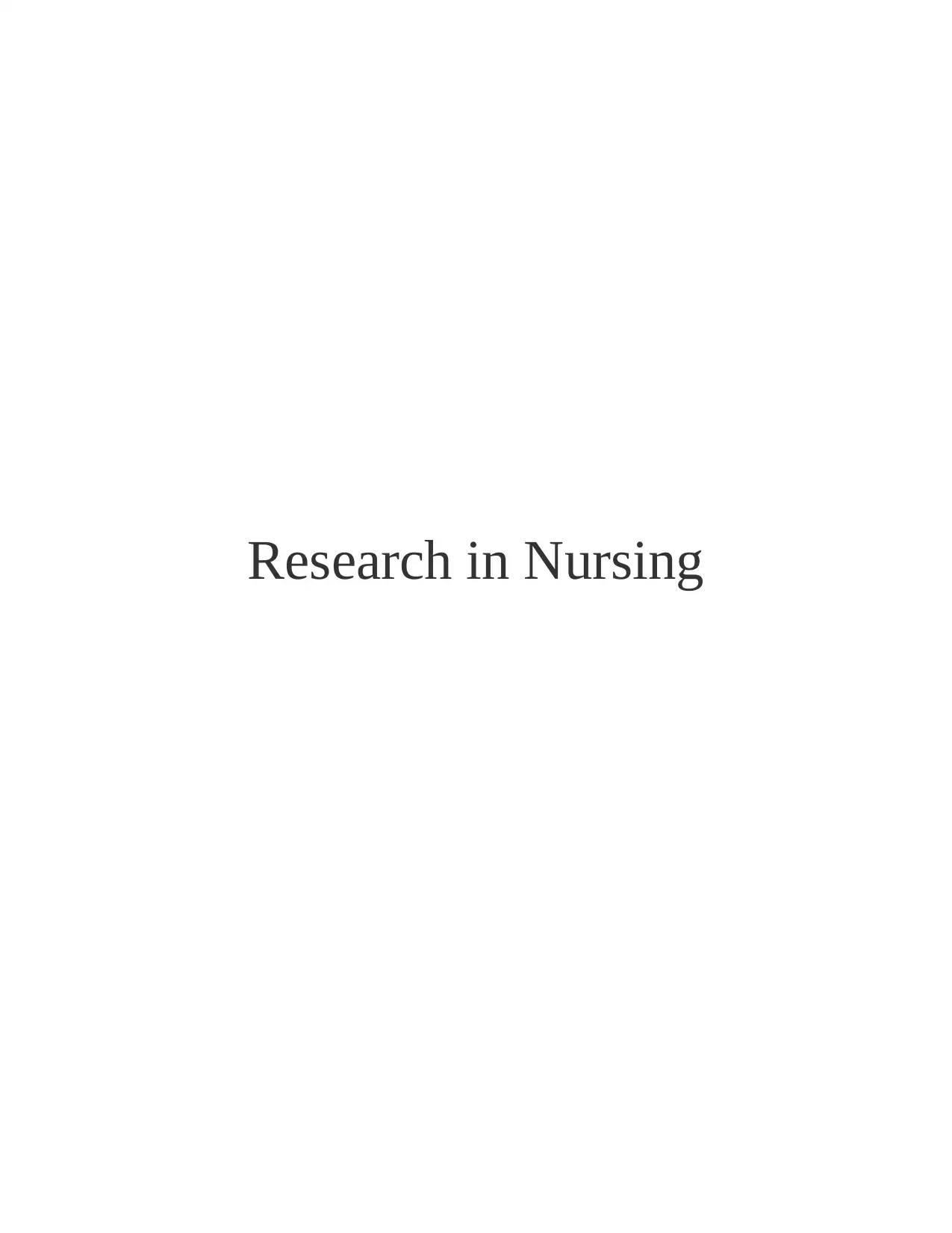
Research in Nursing
Paraphrase This Document
Need a fresh take? Get an instant paraphrase of this document with our AI Paraphraser
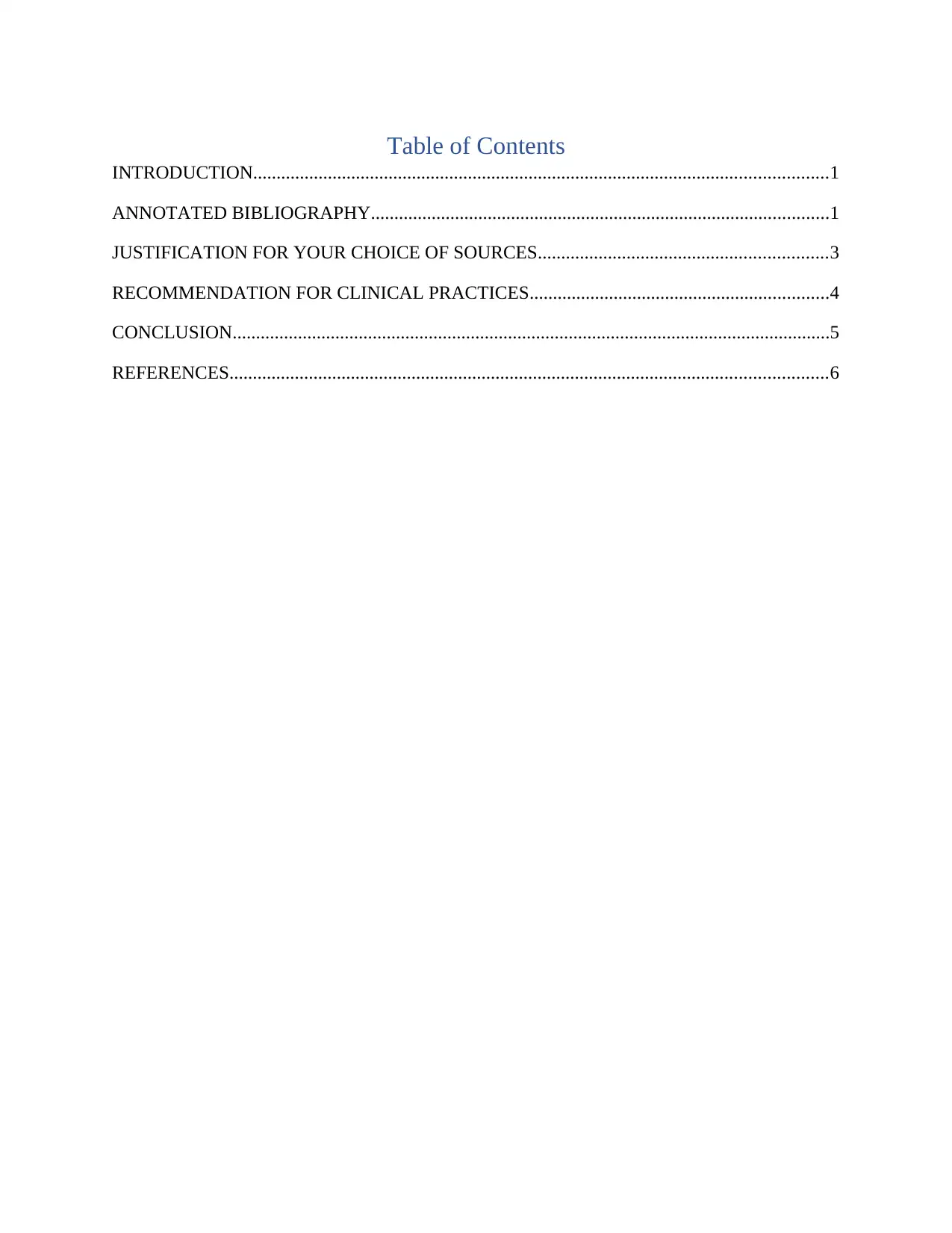
Table of Contents
INTRODUCTION...........................................................................................................................1
ANNOTATED BIBLIOGRAPHY..................................................................................................1
JUSTIFICATION FOR YOUR CHOICE OF SOURCES..............................................................3
RECOMMENDATION FOR CLINICAL PRACTICES................................................................4
CONCLUSION................................................................................................................................5
REFERENCES................................................................................................................................6
INTRODUCTION...........................................................................................................................1
ANNOTATED BIBLIOGRAPHY..................................................................................................1
JUSTIFICATION FOR YOUR CHOICE OF SOURCES..............................................................3
RECOMMENDATION FOR CLINICAL PRACTICES................................................................4
CONCLUSION................................................................................................................................5
REFERENCES................................................................................................................................6
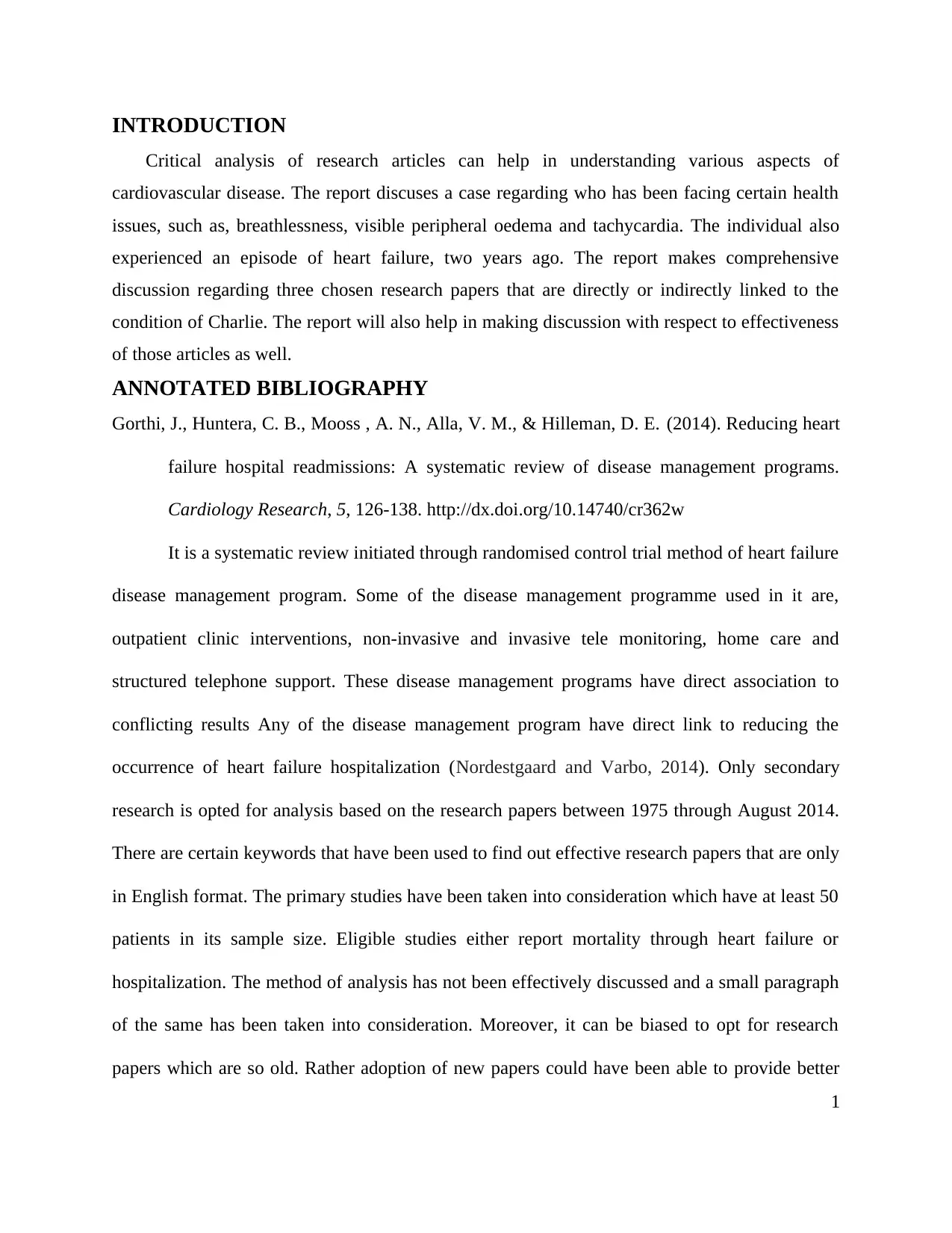
INTRODUCTION
Critical analysis of research articles can help in understanding various aspects of
cardiovascular disease. The report discuses a case regarding who has been facing certain health
issues, such as, breathlessness, visible peripheral oedema and tachycardia. The individual also
experienced an episode of heart failure, two years ago. The report makes comprehensive
discussion regarding three chosen research papers that are directly or indirectly linked to the
condition of Charlie. The report will also help in making discussion with respect to effectiveness
of those articles as well.
ANNOTATED BIBLIOGRAPHY
Gorthi, J., Huntera, C. B., Mooss , A. N., Alla, V. M., & Hilleman, D. E. (2014). Reducing heart
failure hospital readmissions: A systematic review of disease management programs.
Cardiology Research, 5, 126-138. http://dx.doi.org/10.14740/cr362w
It is a systematic review initiated through randomised control trial method of heart failure
disease management program. Some of the disease management programme used in it are,
outpatient clinic interventions, non-invasive and invasive tele monitoring, home care and
structured telephone support. These disease management programs have direct association to
conflicting results Any of the disease management program have direct link to reducing the
occurrence of heart failure hospitalization (Nordestgaard and Varbo, 2014). Only secondary
research is opted for analysis based on the research papers between 1975 through August 2014.
There are certain keywords that have been used to find out effective research papers that are only
in English format. The primary studies have been taken into consideration which have at least 50
patients in its sample size. Eligible studies either report mortality through heart failure or
hospitalization. The method of analysis has not been effectively discussed and a small paragraph
of the same has been taken into consideration. Moreover, it can be biased to opt for research
papers which are so old. Rather adoption of new papers could have been able to provide better
1
Critical analysis of research articles can help in understanding various aspects of
cardiovascular disease. The report discuses a case regarding who has been facing certain health
issues, such as, breathlessness, visible peripheral oedema and tachycardia. The individual also
experienced an episode of heart failure, two years ago. The report makes comprehensive
discussion regarding three chosen research papers that are directly or indirectly linked to the
condition of Charlie. The report will also help in making discussion with respect to effectiveness
of those articles as well.
ANNOTATED BIBLIOGRAPHY
Gorthi, J., Huntera, C. B., Mooss , A. N., Alla, V. M., & Hilleman, D. E. (2014). Reducing heart
failure hospital readmissions: A systematic review of disease management programs.
Cardiology Research, 5, 126-138. http://dx.doi.org/10.14740/cr362w
It is a systematic review initiated through randomised control trial method of heart failure
disease management program. Some of the disease management programme used in it are,
outpatient clinic interventions, non-invasive and invasive tele monitoring, home care and
structured telephone support. These disease management programs have direct association to
conflicting results Any of the disease management program have direct link to reducing the
occurrence of heart failure hospitalization (Nordestgaard and Varbo, 2014). Only secondary
research is opted for analysis based on the research papers between 1975 through August 2014.
There are certain keywords that have been used to find out effective research papers that are only
in English format. The primary studies have been taken into consideration which have at least 50
patients in its sample size. Eligible studies either report mortality through heart failure or
hospitalization. The method of analysis has not been effectively discussed and a small paragraph
of the same has been taken into consideration. Moreover, it can be biased to opt for research
papers which are so old. Rather adoption of new papers could have been able to provide better
1
⊘ This is a preview!⊘
Do you want full access?
Subscribe today to unlock all pages.

Trusted by 1+ million students worldwide
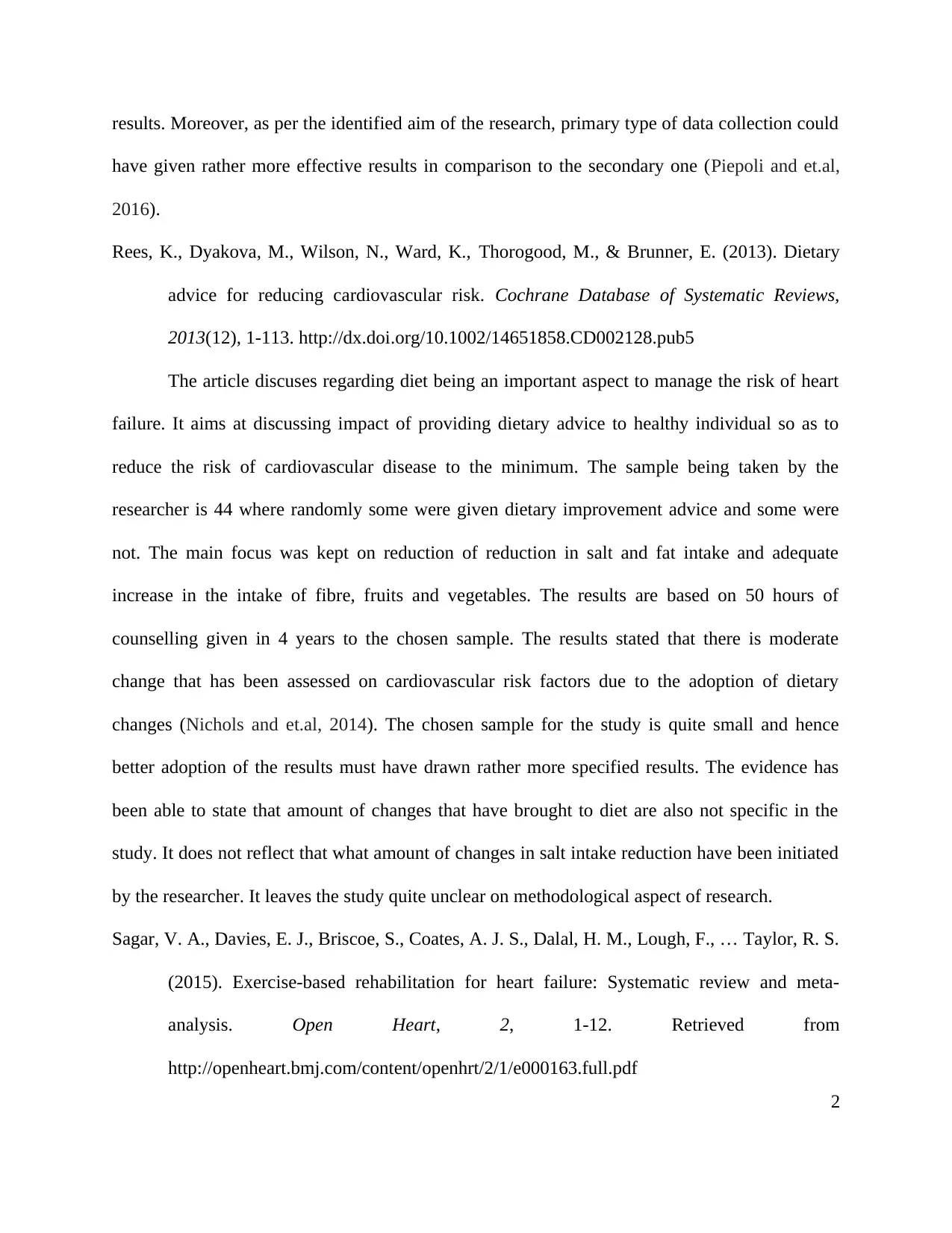
results. Moreover, as per the identified aim of the research, primary type of data collection could
have given rather more effective results in comparison to the secondary one (Piepoli and et.al,
2016).
Rees, K., Dyakova, M., Wilson, N., Ward, K., Thorogood, M., & Brunner, E. (2013). Dietary
advice for reducing cardiovascular risk. Cochrane Database of Systematic Reviews,
2013(12), 1-113. http://dx.doi.org/10.1002/14651858.CD002128.pub5
The article discuses regarding diet being an important aspect to manage the risk of heart
failure. It aims at discussing impact of providing dietary advice to healthy individual so as to
reduce the risk of cardiovascular disease to the minimum. The sample being taken by the
researcher is 44 where randomly some were given dietary improvement advice and some were
not. The main focus was kept on reduction of reduction in salt and fat intake and adequate
increase in the intake of fibre, fruits and vegetables. The results are based on 50 hours of
counselling given in 4 years to the chosen sample. The results stated that there is moderate
change that has been assessed on cardiovascular risk factors due to the adoption of dietary
changes (Nichols and et.al, 2014). The chosen sample for the study is quite small and hence
better adoption of the results must have drawn rather more specified results. The evidence has
been able to state that amount of changes that have brought to diet are also not specific in the
study. It does not reflect that what amount of changes in salt intake reduction have been initiated
by the researcher. It leaves the study quite unclear on methodological aspect of research.
Sagar, V. A., Davies, E. J., Briscoe, S., Coates, A. J. S., Dalal, H. M., Lough, F., … Taylor, R. S.
(2015). Exercise-based rehabilitation for heart failure: Systematic review and meta-
analysis. Open Heart, 2, 1-12. Retrieved from
http://openheart.bmj.com/content/openhrt/2/1/e000163.full.pdf
2
have given rather more effective results in comparison to the secondary one (Piepoli and et.al,
2016).
Rees, K., Dyakova, M., Wilson, N., Ward, K., Thorogood, M., & Brunner, E. (2013). Dietary
advice for reducing cardiovascular risk. Cochrane Database of Systematic Reviews,
2013(12), 1-113. http://dx.doi.org/10.1002/14651858.CD002128.pub5
The article discuses regarding diet being an important aspect to manage the risk of heart
failure. It aims at discussing impact of providing dietary advice to healthy individual so as to
reduce the risk of cardiovascular disease to the minimum. The sample being taken by the
researcher is 44 where randomly some were given dietary improvement advice and some were
not. The main focus was kept on reduction of reduction in salt and fat intake and adequate
increase in the intake of fibre, fruits and vegetables. The results are based on 50 hours of
counselling given in 4 years to the chosen sample. The results stated that there is moderate
change that has been assessed on cardiovascular risk factors due to the adoption of dietary
changes (Nichols and et.al, 2014). The chosen sample for the study is quite small and hence
better adoption of the results must have drawn rather more specified results. The evidence has
been able to state that amount of changes that have brought to diet are also not specific in the
study. It does not reflect that what amount of changes in salt intake reduction have been initiated
by the researcher. It leaves the study quite unclear on methodological aspect of research.
Sagar, V. A., Davies, E. J., Briscoe, S., Coates, A. J. S., Dalal, H. M., Lough, F., … Taylor, R. S.
(2015). Exercise-based rehabilitation for heart failure: Systematic review and meta-
analysis. Open Heart, 2, 1-12. Retrieved from
http://openheart.bmj.com/content/openhrt/2/1/e000163.full.pdf
2
Paraphrase This Document
Need a fresh take? Get an instant paraphrase of this document with our AI Paraphraser
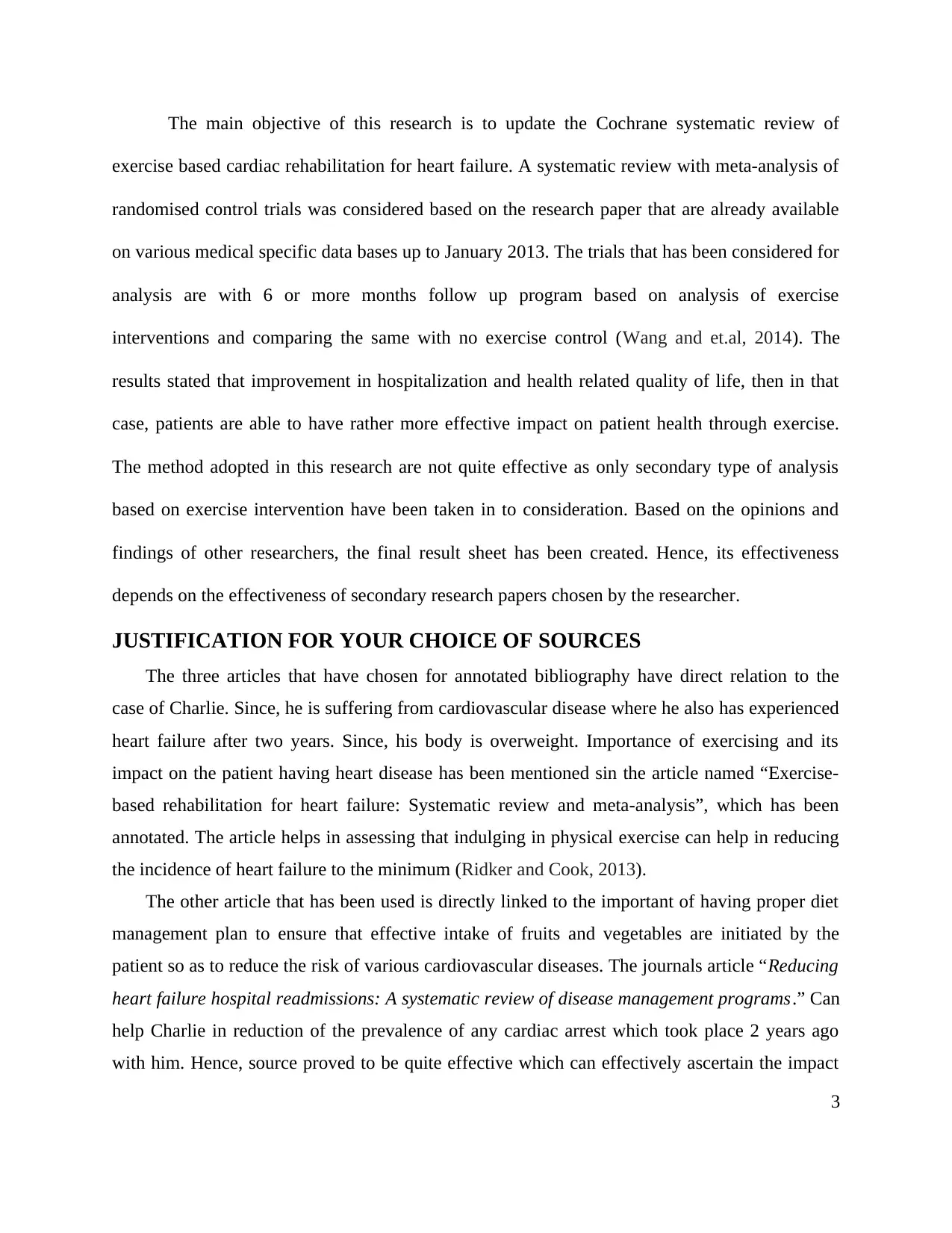
The main objective of this research is to update the Cochrane systematic review of
exercise based cardiac rehabilitation for heart failure. A systematic review with meta-analysis of
randomised control trials was considered based on the research paper that are already available
on various medical specific data bases up to January 2013. The trials that has been considered for
analysis are with 6 or more months follow up program based on analysis of exercise
interventions and comparing the same with no exercise control (Wang and et.al, 2014). The
results stated that improvement in hospitalization and health related quality of life, then in that
case, patients are able to have rather more effective impact on patient health through exercise.
The method adopted in this research are not quite effective as only secondary type of analysis
based on exercise intervention have been taken in to consideration. Based on the opinions and
findings of other researchers, the final result sheet has been created. Hence, its effectiveness
depends on the effectiveness of secondary research papers chosen by the researcher.
JUSTIFICATION FOR YOUR CHOICE OF SOURCES
The three articles that have chosen for annotated bibliography have direct relation to the
case of Charlie. Since, he is suffering from cardiovascular disease where he also has experienced
heart failure after two years. Since, his body is overweight. Importance of exercising and its
impact on the patient having heart disease has been mentioned sin the article named “Exercise-
based rehabilitation for heart failure: Systematic review and meta-analysis”, which has been
annotated. The article helps in assessing that indulging in physical exercise can help in reducing
the incidence of heart failure to the minimum (Ridker and Cook, 2013).
The other article that has been used is directly linked to the important of having proper diet
management plan to ensure that effective intake of fruits and vegetables are initiated by the
patient so as to reduce the risk of various cardiovascular diseases. The journals article “Reducing
heart failure hospital readmissions: A systematic review of disease management programs.” Can
help Charlie in reduction of the prevalence of any cardiac arrest which took place 2 years ago
with him. Hence, source proved to be quite effective which can effectively ascertain the impact
3
exercise based cardiac rehabilitation for heart failure. A systematic review with meta-analysis of
randomised control trials was considered based on the research paper that are already available
on various medical specific data bases up to January 2013. The trials that has been considered for
analysis are with 6 or more months follow up program based on analysis of exercise
interventions and comparing the same with no exercise control (Wang and et.al, 2014). The
results stated that improvement in hospitalization and health related quality of life, then in that
case, patients are able to have rather more effective impact on patient health through exercise.
The method adopted in this research are not quite effective as only secondary type of analysis
based on exercise intervention have been taken in to consideration. Based on the opinions and
findings of other researchers, the final result sheet has been created. Hence, its effectiveness
depends on the effectiveness of secondary research papers chosen by the researcher.
JUSTIFICATION FOR YOUR CHOICE OF SOURCES
The three articles that have chosen for annotated bibliography have direct relation to the
case of Charlie. Since, he is suffering from cardiovascular disease where he also has experienced
heart failure after two years. Since, his body is overweight. Importance of exercising and its
impact on the patient having heart disease has been mentioned sin the article named “Exercise-
based rehabilitation for heart failure: Systematic review and meta-analysis”, which has been
annotated. The article helps in assessing that indulging in physical exercise can help in reducing
the incidence of heart failure to the minimum (Ridker and Cook, 2013).
The other article that has been used is directly linked to the important of having proper diet
management plan to ensure that effective intake of fruits and vegetables are initiated by the
patient so as to reduce the risk of various cardiovascular diseases. The journals article “Reducing
heart failure hospital readmissions: A systematic review of disease management programs.” Can
help Charlie in reduction of the prevalence of any cardiac arrest which took place 2 years ago
with him. Hence, source proved to be quite effective which can effectively ascertain the impact
3
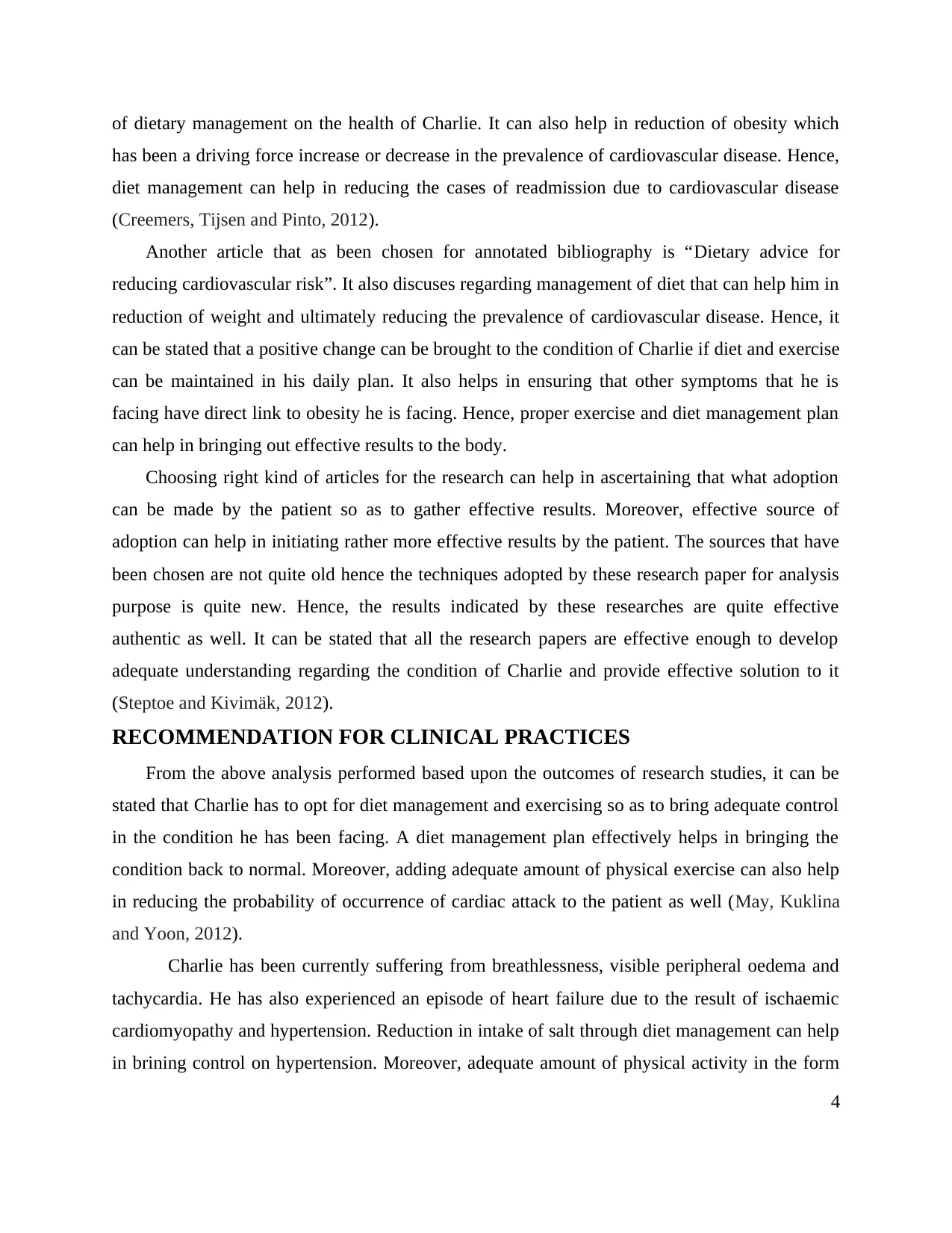
of dietary management on the health of Charlie. It can also help in reduction of obesity which
has been a driving force increase or decrease in the prevalence of cardiovascular disease. Hence,
diet management can help in reducing the cases of readmission due to cardiovascular disease
(Creemers, Tijsen and Pinto, 2012).
Another article that as been chosen for annotated bibliography is “Dietary advice for
reducing cardiovascular risk”. It also discuses regarding management of diet that can help him in
reduction of weight and ultimately reducing the prevalence of cardiovascular disease. Hence, it
can be stated that a positive change can be brought to the condition of Charlie if diet and exercise
can be maintained in his daily plan. It also helps in ensuring that other symptoms that he is
facing have direct link to obesity he is facing. Hence, proper exercise and diet management plan
can help in bringing out effective results to the body.
Choosing right kind of articles for the research can help in ascertaining that what adoption
can be made by the patient so as to gather effective results. Moreover, effective source of
adoption can help in initiating rather more effective results by the patient. The sources that have
been chosen are not quite old hence the techniques adopted by these research paper for analysis
purpose is quite new. Hence, the results indicated by these researches are quite effective
authentic as well. It can be stated that all the research papers are effective enough to develop
adequate understanding regarding the condition of Charlie and provide effective solution to it
(Steptoe and Kivimäk, 2012).
RECOMMENDATION FOR CLINICAL PRACTICES
From the above analysis performed based upon the outcomes of research studies, it can be
stated that Charlie has to opt for diet management and exercising so as to bring adequate control
in the condition he has been facing. A diet management plan effectively helps in bringing the
condition back to normal. Moreover, adding adequate amount of physical exercise can also help
in reducing the probability of occurrence of cardiac attack to the patient as well (May, Kuklina
and Yoon, 2012).
Charlie has been currently suffering from breathlessness, visible peripheral oedema and
tachycardia. He has also experienced an episode of heart failure due to the result of ischaemic
cardiomyopathy and hypertension. Reduction in intake of salt through diet management can help
in brining control on hypertension. Moreover, adequate amount of physical activity in the form
4
has been a driving force increase or decrease in the prevalence of cardiovascular disease. Hence,
diet management can help in reducing the cases of readmission due to cardiovascular disease
(Creemers, Tijsen and Pinto, 2012).
Another article that as been chosen for annotated bibliography is “Dietary advice for
reducing cardiovascular risk”. It also discuses regarding management of diet that can help him in
reduction of weight and ultimately reducing the prevalence of cardiovascular disease. Hence, it
can be stated that a positive change can be brought to the condition of Charlie if diet and exercise
can be maintained in his daily plan. It also helps in ensuring that other symptoms that he is
facing have direct link to obesity he is facing. Hence, proper exercise and diet management plan
can help in bringing out effective results to the body.
Choosing right kind of articles for the research can help in ascertaining that what adoption
can be made by the patient so as to gather effective results. Moreover, effective source of
adoption can help in initiating rather more effective results by the patient. The sources that have
been chosen are not quite old hence the techniques adopted by these research paper for analysis
purpose is quite new. Hence, the results indicated by these researches are quite effective
authentic as well. It can be stated that all the research papers are effective enough to develop
adequate understanding regarding the condition of Charlie and provide effective solution to it
(Steptoe and Kivimäk, 2012).
RECOMMENDATION FOR CLINICAL PRACTICES
From the above analysis performed based upon the outcomes of research studies, it can be
stated that Charlie has to opt for diet management and exercising so as to bring adequate control
in the condition he has been facing. A diet management plan effectively helps in bringing the
condition back to normal. Moreover, adding adequate amount of physical exercise can also help
in reducing the probability of occurrence of cardiac attack to the patient as well (May, Kuklina
and Yoon, 2012).
Charlie has been currently suffering from breathlessness, visible peripheral oedema and
tachycardia. He has also experienced an episode of heart failure due to the result of ischaemic
cardiomyopathy and hypertension. Reduction in intake of salt through diet management can help
in brining control on hypertension. Moreover, adequate amount of physical activity in the form
4
⊘ This is a preview!⊘
Do you want full access?
Subscribe today to unlock all pages.

Trusted by 1+ million students worldwide
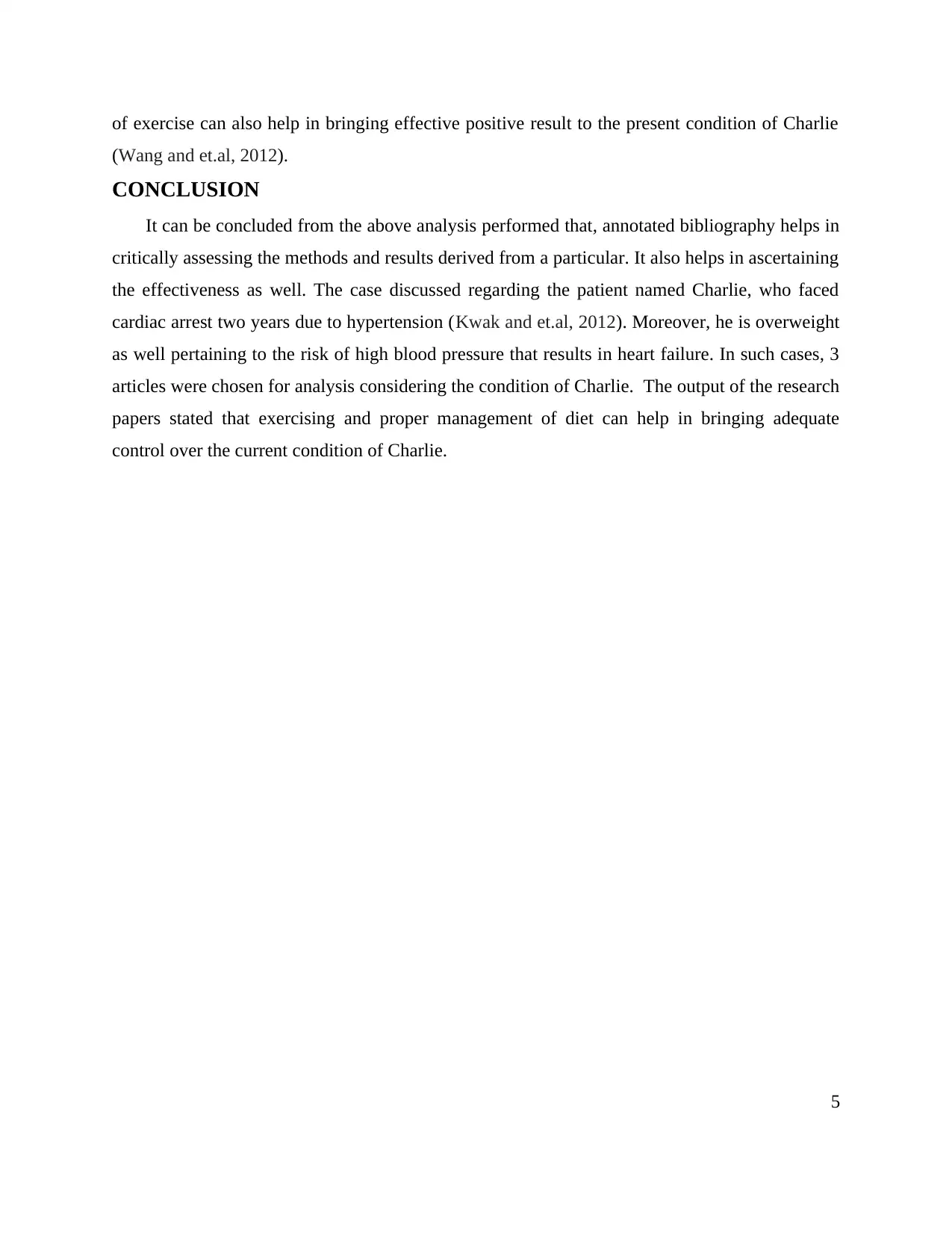
of exercise can also help in bringing effective positive result to the present condition of Charlie
(Wang and et.al, 2012).
CONCLUSION
It can be concluded from the above analysis performed that, annotated bibliography helps in
critically assessing the methods and results derived from a particular. It also helps in ascertaining
the effectiveness as well. The case discussed regarding the patient named Charlie, who faced
cardiac arrest two years due to hypertension (Kwak and et.al, 2012). Moreover, he is overweight
as well pertaining to the risk of high blood pressure that results in heart failure. In such cases, 3
articles were chosen for analysis considering the condition of Charlie. The output of the research
papers stated that exercising and proper management of diet can help in bringing adequate
control over the current condition of Charlie.
5
(Wang and et.al, 2012).
CONCLUSION
It can be concluded from the above analysis performed that, annotated bibliography helps in
critically assessing the methods and results derived from a particular. It also helps in ascertaining
the effectiveness as well. The case discussed regarding the patient named Charlie, who faced
cardiac arrest two years due to hypertension (Kwak and et.al, 2012). Moreover, he is overweight
as well pertaining to the risk of high blood pressure that results in heart failure. In such cases, 3
articles were chosen for analysis considering the condition of Charlie. The output of the research
papers stated that exercising and proper management of diet can help in bringing adequate
control over the current condition of Charlie.
5
Paraphrase This Document
Need a fresh take? Get an instant paraphrase of this document with our AI Paraphraser
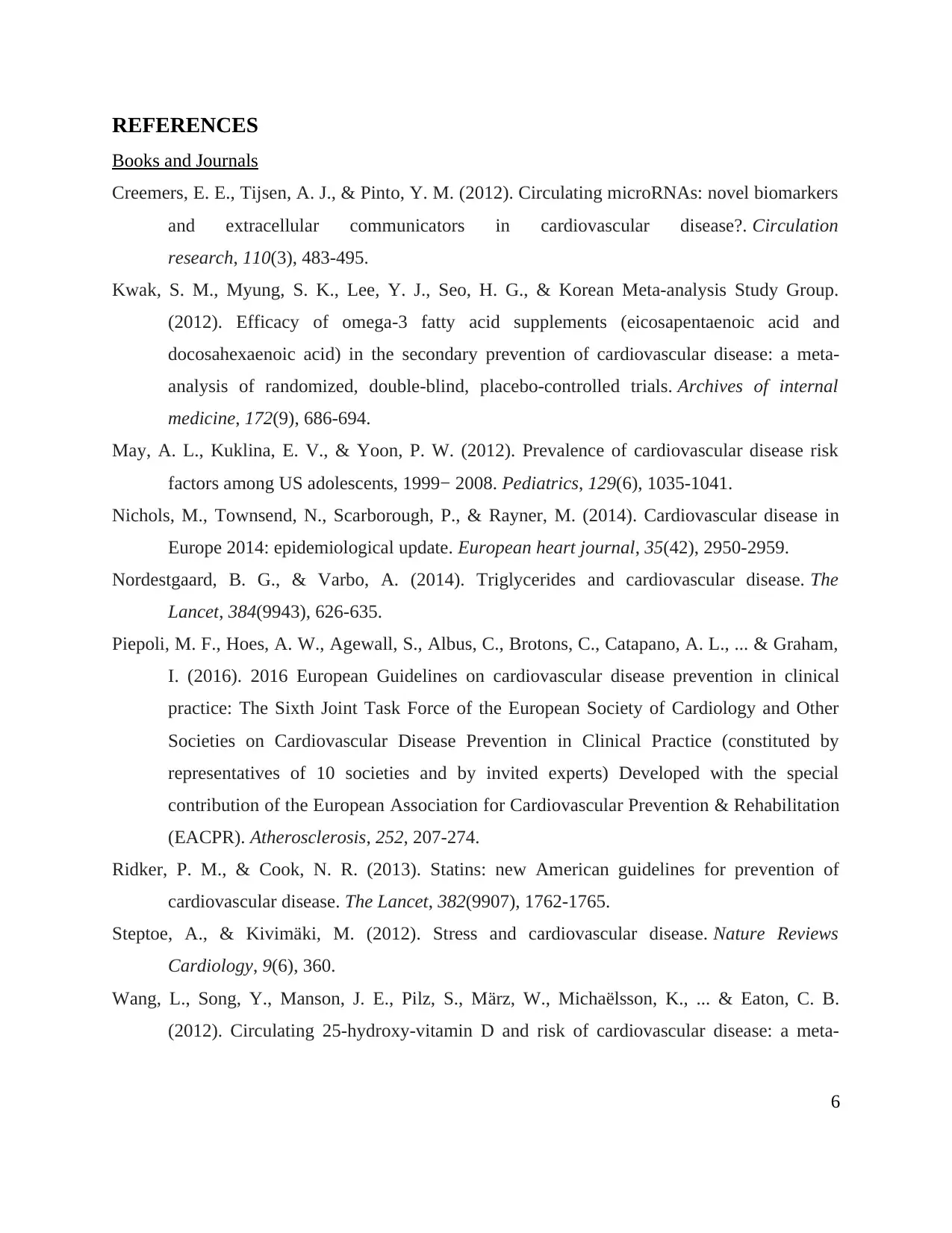
REFERENCES
Books and Journals
Creemers, E. E., Tijsen, A. J., & Pinto, Y. M. (2012). Circulating microRNAs: novel biomarkers
and extracellular communicators in cardiovascular disease?. Circulation
research, 110(3), 483-495.
Kwak, S. M., Myung, S. K., Lee, Y. J., Seo, H. G., & Korean Meta-analysis Study Group.
(2012). Efficacy of omega-3 fatty acid supplements (eicosapentaenoic acid and
docosahexaenoic acid) in the secondary prevention of cardiovascular disease: a meta-
analysis of randomized, double-blind, placebo-controlled trials. Archives of internal
medicine, 172(9), 686-694.
May, A. L., Kuklina, E. V., & Yoon, P. W. (2012). Prevalence of cardiovascular disease risk
factors among US adolescents, 1999− 2008. Pediatrics, 129(6), 1035-1041.
Nichols, M., Townsend, N., Scarborough, P., & Rayner, M. (2014). Cardiovascular disease in
Europe 2014: epidemiological update. European heart journal, 35(42), 2950-2959.
Nordestgaard, B. G., & Varbo, A. (2014). Triglycerides and cardiovascular disease. The
Lancet, 384(9943), 626-635.
Piepoli, M. F., Hoes, A. W., Agewall, S., Albus, C., Brotons, C., Catapano, A. L., ... & Graham,
I. (2016). 2016 European Guidelines on cardiovascular disease prevention in clinical
practice: The Sixth Joint Task Force of the European Society of Cardiology and Other
Societies on Cardiovascular Disease Prevention in Clinical Practice (constituted by
representatives of 10 societies and by invited experts) Developed with the special
contribution of the European Association for Cardiovascular Prevention & Rehabilitation
(EACPR). Atherosclerosis, 252, 207-274.
Ridker, P. M., & Cook, N. R. (2013). Statins: new American guidelines for prevention of
cardiovascular disease. The Lancet, 382(9907), 1762-1765.
Steptoe, A., & Kivimäki, M. (2012). Stress and cardiovascular disease. Nature Reviews
Cardiology, 9(6), 360.
Wang, L., Song, Y., Manson, J. E., Pilz, S., März, W., Michaëlsson, K., ... & Eaton, C. B.
(2012). Circulating 25-hydroxy-vitamin D and risk of cardiovascular disease: a meta-
6
Books and Journals
Creemers, E. E., Tijsen, A. J., & Pinto, Y. M. (2012). Circulating microRNAs: novel biomarkers
and extracellular communicators in cardiovascular disease?. Circulation
research, 110(3), 483-495.
Kwak, S. M., Myung, S. K., Lee, Y. J., Seo, H. G., & Korean Meta-analysis Study Group.
(2012). Efficacy of omega-3 fatty acid supplements (eicosapentaenoic acid and
docosahexaenoic acid) in the secondary prevention of cardiovascular disease: a meta-
analysis of randomized, double-blind, placebo-controlled trials. Archives of internal
medicine, 172(9), 686-694.
May, A. L., Kuklina, E. V., & Yoon, P. W. (2012). Prevalence of cardiovascular disease risk
factors among US adolescents, 1999− 2008. Pediatrics, 129(6), 1035-1041.
Nichols, M., Townsend, N., Scarborough, P., & Rayner, M. (2014). Cardiovascular disease in
Europe 2014: epidemiological update. European heart journal, 35(42), 2950-2959.
Nordestgaard, B. G., & Varbo, A. (2014). Triglycerides and cardiovascular disease. The
Lancet, 384(9943), 626-635.
Piepoli, M. F., Hoes, A. W., Agewall, S., Albus, C., Brotons, C., Catapano, A. L., ... & Graham,
I. (2016). 2016 European Guidelines on cardiovascular disease prevention in clinical
practice: The Sixth Joint Task Force of the European Society of Cardiology and Other
Societies on Cardiovascular Disease Prevention in Clinical Practice (constituted by
representatives of 10 societies and by invited experts) Developed with the special
contribution of the European Association for Cardiovascular Prevention & Rehabilitation
(EACPR). Atherosclerosis, 252, 207-274.
Ridker, P. M., & Cook, N. R. (2013). Statins: new American guidelines for prevention of
cardiovascular disease. The Lancet, 382(9907), 1762-1765.
Steptoe, A., & Kivimäki, M. (2012). Stress and cardiovascular disease. Nature Reviews
Cardiology, 9(6), 360.
Wang, L., Song, Y., Manson, J. E., Pilz, S., März, W., Michaëlsson, K., ... & Eaton, C. B.
(2012). Circulating 25-hydroxy-vitamin D and risk of cardiovascular disease: a meta-
6
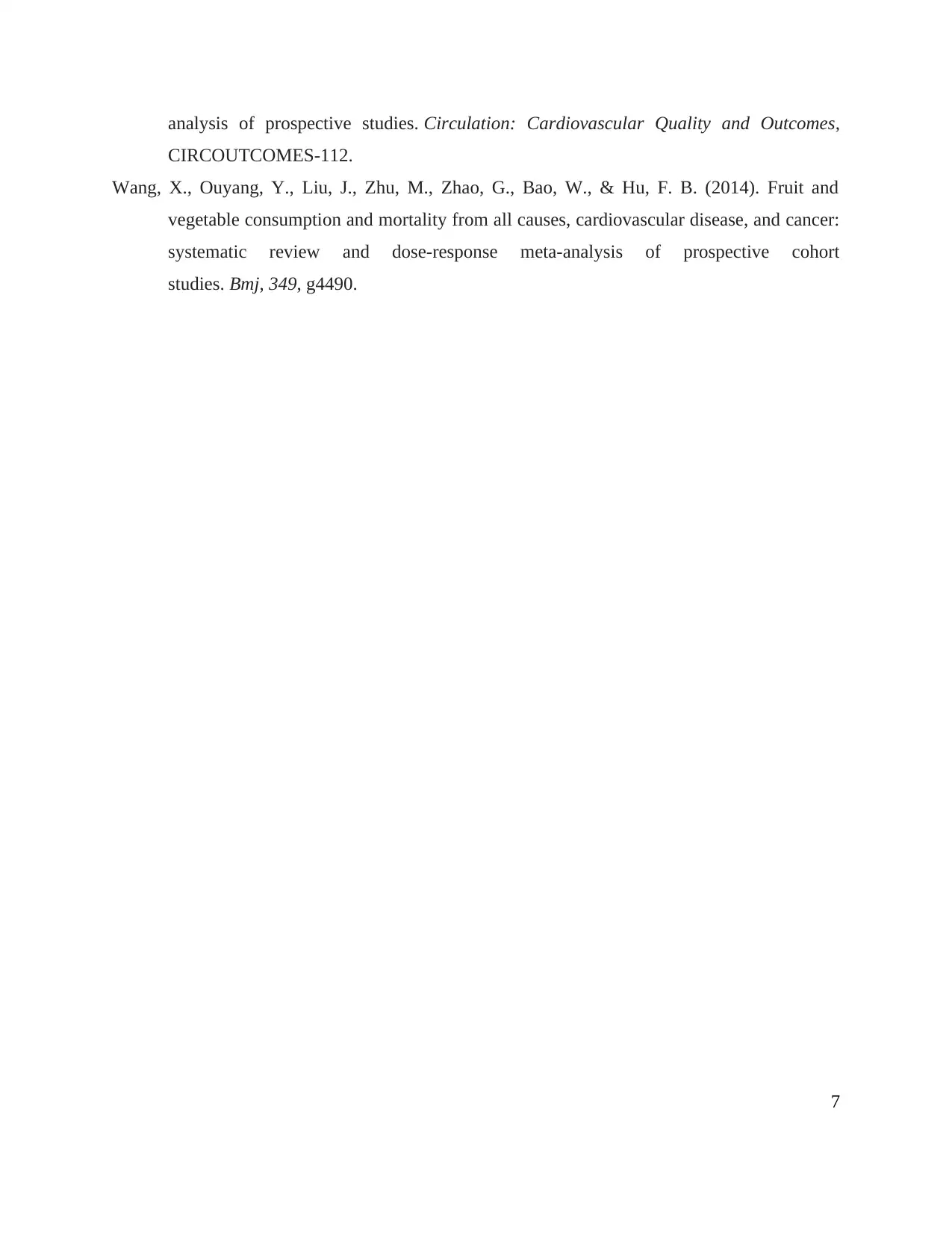
analysis of prospective studies. Circulation: Cardiovascular Quality and Outcomes,
CIRCOUTCOMES-112.
Wang, X., Ouyang, Y., Liu, J., Zhu, M., Zhao, G., Bao, W., & Hu, F. B. (2014). Fruit and
vegetable consumption and mortality from all causes, cardiovascular disease, and cancer:
systematic review and dose-response meta-analysis of prospective cohort
studies. Bmj, 349, g4490.
7
CIRCOUTCOMES-112.
Wang, X., Ouyang, Y., Liu, J., Zhu, M., Zhao, G., Bao, W., & Hu, F. B. (2014). Fruit and
vegetable consumption and mortality from all causes, cardiovascular disease, and cancer:
systematic review and dose-response meta-analysis of prospective cohort
studies. Bmj, 349, g4490.
7
⊘ This is a preview!⊘
Do you want full access?
Subscribe today to unlock all pages.

Trusted by 1+ million students worldwide
1 out of 9
Related Documents
Your All-in-One AI-Powered Toolkit for Academic Success.
+13062052269
info@desklib.com
Available 24*7 on WhatsApp / Email
![[object Object]](/_next/static/media/star-bottom.7253800d.svg)
Unlock your academic potential
Copyright © 2020–2026 A2Z Services. All Rights Reserved. Developed and managed by ZUCOL.





